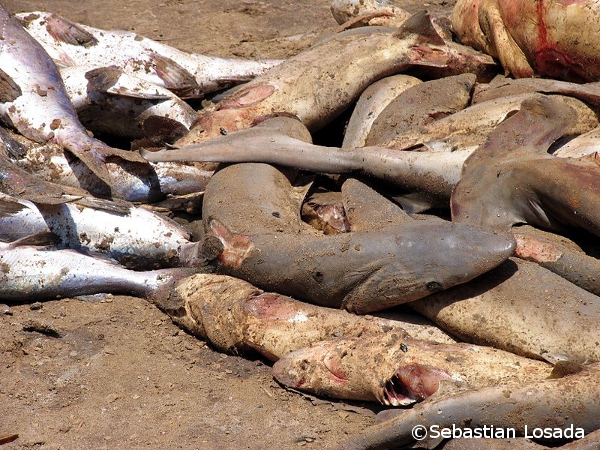
Scientists say the shark fin trade has contributed to the catastrophic declines of shark populations worldwide. It threatens to disrupt ocean ecosystems and encourages the proliferation of other predators, which in turn diminishes stocks of fish for human consumption. Finning involves cutting off the fins of sharks then throwing them back into the ocean, often while still alive. The fins are used in the preparation of shark fin soup, which has traditionally been considered a Chinese delicacy.
“We call on other governments to join us in protecting sharks in their waters, for the sake of healthy coastal marine ecosystems and economic development.” These were the words of the president of Honduras, Porfirio Lobo Sosa, on June 24th, the day he announced a permanent ban on fishing sharks in Honduras’ waters. Building on the moratorium on shark-fishing which the country established in 2010, this ban represents a sanctuary of 240,000 square kilometres of the country’s Pacific and Caribbean coasts where sharks may not be fished commercially. The Pacific island nation of Palau established a similar ban in 2009
July 1st, brought more news from Hawaii. Restaurants, in that nation, reached the end of the grace period for them to use their supply of shark fins, following the legislation enacted last year banning the possession, sale and distribution of sharks or shark parts. This law was of particular importance given Hawaii did not only have a large internal market for shark fin soup but was often used as a hub for trade in Asia. Guam, the Northern Marianas Islands and Washington State have all enacted similar laws. California is considering imposing a ban on shark fin sales though it has resulted in much controversy from sections of the large Chinese American population in the state.
The news that made the most ripples however, happened on July 5th; when the Bahamas announce a ban on the commercial fishing of sharks in its 630,000 square kilometres of water, along with the sale, import or export of shark products. “Sharks themselves are in trouble world-wide. 70-80 million sharks are taken every year out of the ocean, and they are very slow to reproduce and their populations are crashing. So they desperately need the protection if we are not going to drive them to extinction.” Said Neil McKinney, president of the Bahamas National Trust with regards to why the need for such protection. The Bahamas alone contain over 70% of all shark ecotourism in the Greater Caribbean. It has been estimated that this represents $80 million a year for the nation. The Maldives calculated shark based ecotourism contributed more than 30% to their GDP and banned shark fishing in 2010.
More and more countries are gaining an understanding of the importance of harks to their ecosystem and the fact that they are worth more alive than in a bowl of soup. On July 6th Radio Fiji announce the government of Fiji is drafting of a new policy to protect sharks. The reviewed fisheries law is posed to include a ban on the trade of all shark fins and all products from sharks captured in Fiji.
Also on July 6th Chile unanimously passed a ban to prohibit shark finning I its national waters. This does not go as far as prohibiting shark fishing, but bans the landing of detached fins or the transferring of find between vessels. By requiring all sharks land whole they improve their ability to monitor the fisheries and reduce the number of sharks each vessel can catch. While this is short of a ban on shark fishing or possession of shark products it certainly is a significant step in the protection of this incredible group of animals. Other countries that have shark finning regulations are American Samoa, Argentina , Australia (most States Territories), Brazil, Canada, Cape Verde, Colombia, Costa Rica, Ecuador, Egypt, El Salvador, European Union, India, Mexico, Namibia, Nicaragua, Oman, Panama, Seychelles (foreign vessels only), South Africa (in national waters only), Spain, United States. 2011 seems to have been a key year so far for shark conservation. We hope people will continue to realize the value of a healthy shark population to their ecosystems and economy and continue to support policy that protects these incredible creatures.
Here at EDGE we have identified sharks as a conservation concern and worked together with leading scientist to incorporate sharks to our conservation priorities. The vision of EDGE Sharks is to secure the protection of the most endangered sharks, ray and chimaeras that are evolutionarily distinct. The EDGE Sharks programme is still in development. As ever, we are extremely grateful for your support, without which new programmes such as this would not be possible. Visit out Sharks page to find out about update on the project.

